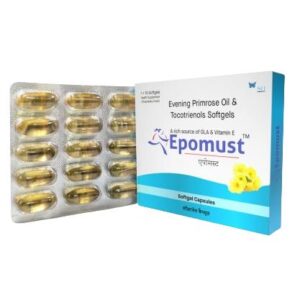PRIMROSE OIL + TOCOPHERY ACETATYE
Primrose Oil: Primrose Oil is a dietary supplement derived from the seeds of the evening primrose plant (Oenothera biennis). It is rich in essential fatty acids, including gamma-linolenic acid (GLA), which is believed to have various health benefits.
Primrose Oil is commonly used to relieve symptoms associated with premenstrual syndrome (PMS) and menopause. It is believed to help alleviate breast pain, bloating, mood swings, and irritability in women experiencing these conditions. Additionally, it may be used to support skin health, reduce inflammation, and improve overall immune function.
The exact mechanism of action of Primrose Oil is not fully understood, but it is thought that the GLA content plays a significant role. GLA is converted in the body to substances that reduce inflammation and promote the production of certain prostaglandins, which are hormone-like compounds involved in various physiological processes.
The recommended dose of Primrose Oil varies depending on the specific condition being treated. For PMS and menopause symptoms, a common dose is 1-3 grams per day, divided into smaller doses. However, it is important to consult with a healthcare professional for personalized dosing recommendations.
Primrose Oil is generally well-tolerated, but some individuals may experience minor side effects such as stomach upset, headache, or rash. Rarely, it may cause allergic reactions. People with bleeding disorders or those taking blood-thinning medications should use Primrose Oil with caution, as it may increase the risk of bleeding. It is advisable to speak with a healthcare professional before starting any new dietary supplement.
Tocophery Acetatye: Tocopheryl Acetate is a synthetic form of vitamin E that is used as a dietary supplement and in some skincare products. It is commonly used to treat vitamin E deficiency in individuals who have difficulties absorbing fat or have conditions that prevent the absorption of fat-soluble vitamins.
The mechanism of action of Tocopheryl Acetate is not fully understood. However, it is known to act as an antioxidant, which helps to protect cells from damage caused by free radicals. It also has anti-inflammatory properties and may play a role in immune function.
In terms of dosage, the recommended daily intake of Tocopheryl Acetate varies depending on age, sex, and specific health conditions. It is important to follow the dosage instructions provided by a healthcare professional or the product label. Generally, a typical adult daily dose is around 15-20 mg.
When used as a dietary supplement, Tocopheryl Acetate is generally considered safe for most people when taken at recommended doses. However, excessive doses of vitamin E can have potential side effects such as nausea, diarrhea, stomach cramps, fatigue, blurred vision, and headache. It can also interfere with blood clotting, so caution should be exercised if taking blood thinning medications.
In skincare products, Tocopheryl Acetate is generally well-tolerated when applied topically. However, some individuals may experience skin irritation, allergic reactions, or dermatitis. It is always recommended to perform a patch test before using any skincare product containing Tocopheryl Acetate.
It is important to note that Tocopheryl Acetate should not be used as a substitute for a well-balanced diet. It is always advisable to consult with a healthcare professional before starting any new dietary supplement, especially if you have any underlying health conditions or are taking other medications.

